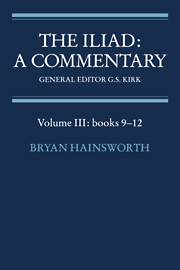2 - The Iliad as heroic poetry
Published online by Cambridge University Press: 03 February 2010
Summary
Comparison between Greek and other epic poetry has produced some of the most fruitful, though not necessarily correct, approaches to the Homeric poems. It is enough to mention Lachmann, Murray, and Parry in this connexion. Comparison is suggestive but can prove nothing, for the basic rule of all analogical reasoning has to be that like is compared with like. Yet the striking thing about the material discussed by H. M. and N. K. Chadwick (1932–40) and Bowra (1952) was how different all these poems and stories were. Bowra used nothing from Africa south of the Sahara or from modern India or Thailand, and tacitly assumed there was no heroic poetry from the New World. Since then the range of material cited by Finnegan (1977) and Hatto (1980–9) suggests that narrative verse is, or has been, universal; the mass of material has also become unwieldy, far more than it is reasonable to expect a single mind to know with the degree of intimacy that validates comparative study. On the broad front co-operative studies such as that directed by Hatto are necessary, while even the investigation of a narrowly defined topic, such as Foley's study (Traditional Oral Epic, 1990) of formulas in Greek, Slavic, and Old English epic (which led to the recognition of what is really fundamental in the composition of the verses) requires a profound knowledge of all three traditions.
- Type
- Chapter
- Information
- The Iliad: A Commentary , pp. 32 - 54Publisher: Cambridge University PressPrint publication year: 1993



